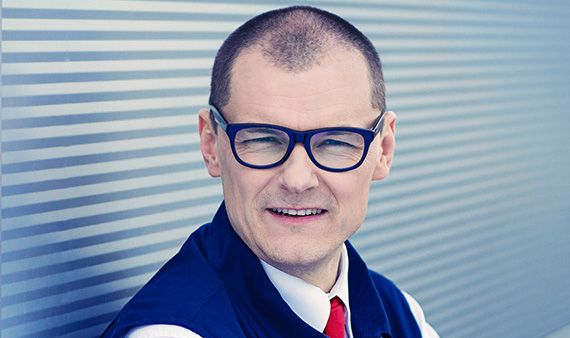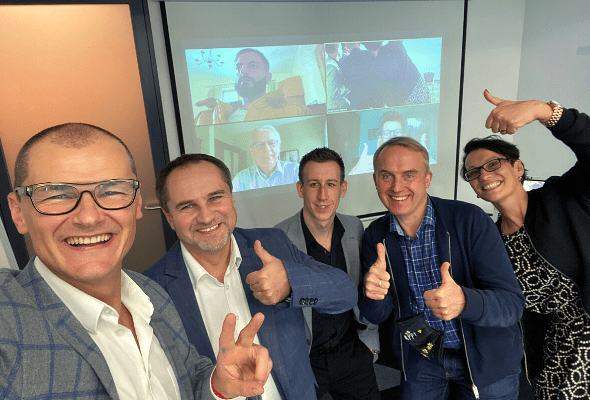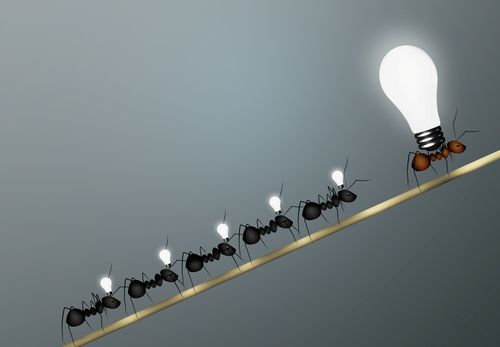
On March 20, 2018, „On Teal Organizations with a Practitioner – An Interview with Marek Wzorek” appeared on Przemek Karczewski’s blog. Marek Wzorek is, among others, a co-founder and CEO of PerfectCircle, an executive and business coach, lecturer and public speaker. He helps organizations grow, develop leadership and transform them into teal organizations.
After more than twenty years of experience in developing companies and teams in Poland and the world, in 2017 he read the book „Reinventing Organizations” by Frederic Laloux and discovered that what he had been doing for the last 10 years with the igus team as managing director and as president of the board, was called „teal organization” He decided to devote his entirety to support people, companies and societies towards building a better, fuller, happier and more creative world, without stress, hatred and anxiety. According to him, the best path to this is the combination of coaching and creating teal organizations. At PerfectCircle, together with the team, he builds a global, teal, self-organized network of coaches, trainers and consultants, supporting clients on their way to creating happier careers.
Simon Sinek is the author of the thesis „start with why”, according to him its the compass to reaching your goals. Mark, what is your life’s WHY?
My life’s WHY is related to past experiences in my private life and at work for various companies in both low and high positions in the organizational hierarchy. Immediately after graduation, I worked as a Technical Advisor for a Swedish company SAPA Building Systems, which was part of a huge aluminum group SAPA. However, we had a small team in Poland and I was at the bottom of the organizational hierarchy, the atmosphere in our team and the whole company varied depending on who was the „boss upstairs”. By enrolling in MBA studies and meeting many business owners, directors and CEOs there, I decided that I would like to be a „director, president or owner of the company”. What all these people connected was sales, because no matter if you produce smartphones, cutlery or information, you always have to reach your recipient and he must find the value for him to buy it from you. So I changed the industry, company and position and started selling as aKey Account Manager. In a company in the B2B industry, where I started working, I developed sales in 4 years from 0 to 8 million Euro in Central and Eastern Europe regions. Thanks to the success in sales, I was asked to manage the commercial part of the enterprise and eventually I became the Director of the entire production plant. Since I was promoted relatively quickly, I suffered the pros and cons of being the „boss upstairs”. It turned out that good relationships and lots of laughter that I once had with my „colleagues downstairs” were no longer the standards in „upstairs” relationships. Now it turned out that I had much more power now, but it also turned out that those who were above me had even more power and unfortunately did not make always the best decisions for the interest of the company, this happens usually because they make those decisions sitting in the warm armchairs at headquarters in Germany, Italy or the USA. Such was the organizational culture of that company during my candidacy.
Searching for a better solution, I decided to look for a company where I will be the CEO in a company in Poland where the team and I will be able to decide on the development of the Polish market. The offer that I received was from igus, as a Managing Director to develop a branch in Poland. At that time I managed a 70-person factory from the food industry and was responsible for the sale of goods; worth tens of millions of euros in Central and Eastern Europe, from Russia and Kazakhstan to Poland and Slovenia. The seven-person igus teams in Poland, with one sales representative in the field worth several million PLN’s, was only attractive to me because of the interesting industry and the possibility of independent decision making of the company’s direction of development. The better I got to know igus, the more it turned out that there was practically no division between „top” and „bottom”. Their so-called „Solar System” has been introduced in the company in 1985 as an organizational model of the company, replacing the traditional hierarchical pyramid. In addition, due to the fact that highly dependent on the polish team, we were able to introduce methods of operation with the team that was constantly growing, and made our work much easier. Due to the organizational chaos that I experienced in 2008, we introduced clear responsibilities, transparency and strong trust for each other.
This kind of organizational model, which I was part of, in a teal environment, turned out to be quite a popular operating model for modern companies, that put high focus on flexibility, creativity, employee involvement and thanks to that have much better financial results.
As you can see from the above story, MY life’s WHY were formed from these questions:
- Why can’t all companies in Poland get rid of the rigid hierarchy, divisions and enter a more modern way of management?
- Why do companies still stick to the division between „up” and „down”, despite the fact that inside each of us is a brilliant, wonderful person and we should value a person more or less?
- Why couldn’t other CEOs in Poland feel more joy, looseness and become colleagues for colleagues in the organization?
- Why should people on machines or telephone lines have worse working conditions than those in board offices?
That is why my main life goal is to support companies in creating happier jobs and changing the way of management.
The trend for teal organizations has become very popular. What do you think? Why?
The trend of teal organizations is growing because people are beginning to notice that the current work model, which worked well in mass production, in the current, rapidly changing world is slowly ceasing to work. In addition, people notice that technological changes such as the Internet, social media, blockchain technologies are not based on hierarchical management, but are co-created by a network of loosely connected users.
An increasing number of people are also beginning to notice the social and business changes that are taking place. The fact that the Millennials generation has completely different needs in relation to the needs of the Baby Boomers generation and that often these Millennials, despite the lack of huge budgets, luggage of experience and business knowledge, create startups that outperform traditional businesses that have been around for centuries.
What is your definition of teal?
I still define teal by the three pillars of teal organizations described by Frederic Laloux in the book „Reinventing Organizations.” Teal organization should ensure in its organizational culture it includes: self-organization, fullness and an evolutionary purpose (sense of existence) .
Please give an example of a teal organization that you know, which is a teal Grail for you. What makes it stand out from other teal organizations?
Of course, I would like to give examples of companies that I co-created or co-create myself, because they lay closest to my heart, but both in igus and PerfectCircle, in my opinion, we still have elements to refine in order to become fully teal, so I will distinguish a company from the USA and I need to do a bit of traveling in Poland to meet all current teal organizations that Poland has to offer.
As a foreign example I would like to mention Sounds True (www.soundtrue.com) because their sense of existence is sublime and clear for the whole world, dogs even contribute to the organization and they are very creative details on the website.They show how modern companies will operate in the future, in perfect harmony, not only at the board and employee level, but even at the level of all company employees and their pets.
What do you think is the main factor to successfully transform your organization into a teal one?
The main factor, which I have experienced would be the full agreement of the owners and the management board and they agree about the need for change. If this consent is already there and the desire to make a change, then the rest of the process will be a piece of cake.
Does teal have flaws?
If you eat too much honey you could certainly be overwhelmed by sweetness. Of course, even the best things can have flaws. Just as we can now start to evaluate our „orange” management methods critically and look for new alternatives, at the same time „teal style of management” will be able to be assessed from a critical perspective and we can mention what does not work. At the moment, this is not the subject of my reflection.
What have you read recently?
Oh, a lot and all based on teal, for example: „In spite of stereotypes” – Ricardo Semler and „The future of management” – Gary Hamel.
In the book „In spite of stereotypes” the transformation of the production company Semco from Brazil is very accurately and vividly shown, which was carried out by the son of the founder Ricardo Semler as early as the 1980s. During those times this case appeared in the Harvard Business Review and management experts from the largest companies in the world, such as IBM, General Motors, Ford, Goodyear, Alcoa, came to visit the offices and plants of Semco to admire management in different way, self-organizing, without hierarchy, to see the commitment of employees of Semco, something that didn’t exist in the United States and Europe at the time.
As with igus, which I co-created for years, also Semco can be referred to the three pillars of teal organizations described by Frederic Laloux in the book „Reinventing Organizations”: self-organization, fullness and evolutionary purpose. In those years, of course, nobody was talking about „teal organizations”, which was established much later.
I will give two specific examples of self-management at Semco. Making truly significant decisions, such as buying another company, was preceded by a vote in which all Semco employees took part.
At one point, on one weekend Semco production workers painted the walls themselves with all kinds of different colors. Each department had its own color. After the weekend Office workers arrived and saw the painted walls in the departments of their colleagues and figured why should they be in worse conditions. The next weekend office workers painted their offices as well.
In addition, 3 quotes from this book:
„The era of using people as a work tool is coming to an end. Participation is infinitely more complicated in practice than traditional arbitrariness, just as democracy is much more uncomfortable than dictatorship. But few companies will be able to afford to disregard one or the other.”
„Whenever I’m in a conventional factory, I’m struck by how little progress has been made since Taylor.”
„Today, anyone who wants to become a mechanic at Semco must have a conversation with a group of mechanics, not the director, which is the worst thing that can happen to him, because the boss he may somehow be able to convince, but not people who know everything about it what it means to be a mechanic and who can become his work companions.”
The second book is another item by Gary Hamel, a visiting professor at Harvard Business School and Strategic Management at London Business School with the beautiful title „The Future of Management”. Gary Hamel in this book also, like Frederic Laloux, notes the problem in current traditionally managed companies of „wasting the resources of human imagination”. In addition, he gives examples of organizations that are modern managed companies such as Google, Toyota, Whole Foods, Dell, Morning Star or W.L.Gore. I wrote down one quote from this book:
„One man with passion can replace forty employees with low interest”
What other books about teal besides „Work Differently” Laloux are worth reading?
Certainly, in addition to the ones I mentioned, there are also: „The boss who has time” – Andrzej Jeznach, „The doctrine of quality. Teal II edition. A thing about teal self-organization „- Andrzej Jacek Blikle,” Management 3.0 „- Jurgen Appelo,” Leaders eat last „- Simon Sinek,” Holacracy: The New Management System for a Rapidly Changing World „- Brian J. Robertson,” Spiral Dynamics”- Don Beck and many many other authors who may not be called 100% teal but write about the same thing using other words and names like Ken Wilber, Peter F. Drucker, Clare W. Graves, Abraham Maslow, Robert Kegan, John P. Kotter.
Where can you be found online?
Most news about myself and teal can be found on my LinkedIn profile, as well as Facebook and at www.PerfectCircle.pl. I invite you and thank you for the active commenting. Every comment or good word inspires you to do more and I plan to write a book about teal organizations and a new way of management this year, so any support will definitely come in handy. The topic of teal organizations is still not a topic well understood in our society and even among managers or entrepreneurs. It is a pity, because we now have a historical moment in Poland and in the world to start managing our natural resources, production and companies in a more sustainable, smarter and better way. Creating teal organizations, not based on hierarchy but on equality and service, is just one of many possibilities so that may all work better, wiser and be more honest towards ourselves and towards others.
Marek, thank you so much for finding time for this conversation. I wish to keep up this energy that you have, and that all your current and planned projects will have definite success.
Przemek, thank you for inviting me to this interview. I will end with two quotes from Albert Einstein, whose views are very close to my heart:
„Man’s main calling is to serve rather than to obey”
and
„Democracy is my political ideal. I would like everyone to be respected as an individual and not to be taken to a pedestal.”
Our companies, society and the whole world would look even better if everyone could „serve than be forced to listen.” Everyone, however, must start with themselves first.
I agree one hundred percent.

